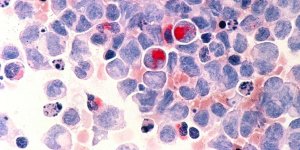Health News

Young children with a history of eating problems in the first three years of life (...) »

Scientists have found that a process in cells may limit infectivity of SARS-CoV-2, and that mutations in the alpha and delta (...) »

Surpassed only by water, tea is the second most consumed beverage worldwide. »

Music can reduce electrical activity surges in some patients. »

Infants who sleep longer through the night and with fewer interruptions may be less likely to (...) »

Researchers probe mechanical performance of red blood cells. »

Cambridge researchers have discovered how T cells are able keep on killing as they hunt down and kill cancer cells, repeatedly reloading their toxic weapons. »

Wildfire smoke linked to fatal heart and lung conditions. »

Organoids could help researchers develop and test new treatments for pancreatic cancer. »

Almost two million people worldwide die of work-related causes, according to joint estimates by (...) »

As more workers and students return to offices and schools, a new model has been developed to (...) »

Bacteria that cause infections becoming increasingly resistant. »

NIH study in mice demonstrates the importance of quickly addressing infection. »

Scientists from the National Institute of Allergy and Infectious Diseases, describe the structure of a key protein on the surface of the hepatitis C virus and (...) »

Supercomputing-derived movies reveal details of deceptive sugar coating on spike protein. »

Common medications can accumulate in gut bacteria (...) »

Researchers measured life's metabolic highs and lows, from birth to old age. »

A genomic analysis of lung cancer in people with no history of smoking has found that a majority of these tumors arise from the accumulation of (...) »

Carnivorous animals lack key genes needed to detect and respond to infection by pathogens, a study has found. »

When comparing first-time prescriptions of a single medication for high blood pressure, angiotensin-converting enzyme (...) »

National Institutes of Health scientists studying SARS-CoV-2, the virus that causes COVID-19, have defined in Syrian hamsters how different routes of virus exposure are linked to disease severity. »

One dose of a new monoclonal antibody discovered and developed at the National Institutes of Health safely prevented malaria for up to nine months in people who were exposed to the malaria parasite. »

New device could help guide recovery after treatment for head and neck cancer. »

People with type 2 diabetes diagnosed during youth have a high risk of developing complications at early ages and have a greater chance of multiple complications within 15 years after diagnosis. »

Scientists at Cambridge and Leeds have successfully reversed age-related memory loss in mice and say their discovery could lead to the development of treatments to prevent memory loss in people as they age. »

NIH study in monkeys finds that in visual decision-making, information relevant to the decision is broadcast widely. »

Preclinical changes in the gut could inform treatment and prevention. »

Why animal behavior changes in proximity to human development. »

Scientists have designed a device to inactivate a bacterium that causes infection. »

Scientists have developed a ‘nanobody’ that is capable of (...) »

Polyphenols are plant compounds that double as cancer-fighting antioxidants. »

Study finds frequency, intensity of monthly migraines declined among those on higher fish oil diet. »

During development the brain can repurpose parts when learning to recognize faces and to read. »

Regular physical activity has positive effects on children's developing brain circuits. »

Switching off a heart muscle protein could provide a new way for drugs to combat heart failure in people who’ve had a heart attack, according to research led by the University of Cambridge. »

Scientists discover that the resting brain repeatedly replays compressed memories of what was just practiced. »

Vaccines against polio and measles can protect against COVID-19. »

The immune system’s attempt to eliminate Salmonella bacteria from the gastrointestinal tract (...) »

Scientists have developed a brain-computer interface (BCI) designed to restore the ability to communicate in people with spinal cord injuries and neurological disorders such as amyotrophic lateral sclerosis (ALS). »

Mitochondria play an unexpected role in common diseases such (...) »

Future of digital memory storage may be in chemically synthesized DNA. »

Scientists determined that stomach inflammation is regulated differently in male and female mice after finding that androgens (...) »

Researchers believe that walking only 4,400 steps a day, rather than the 10,000 steps often recommended, might be sufficient to protect against serious illnesses. »

A fungal disease called mucormycosis is emerging among hundreds of COVID-19 patients in India, placing further strain on hospitals already at breaking point. »

Scientists find way to synthesize plant compound to combat cancer protein. »

Six years ago, scientist Michael Niederweis described the first toxin ever found for the deadly pathogen Mycobacterium tuberculosis. »

Experiencing bullying and forms of aggression in late adolescence and early adulthood is linked (...) »

Researchers have created a dietary tool to aid healthy food choices and cut climate change risks. »

Biodiversity loss increases exposure to new and established pathogens. »

Scientists have made a promising step towards developing a new drug for treating acute myeloid leukaemia, a rare blood disorder. »
